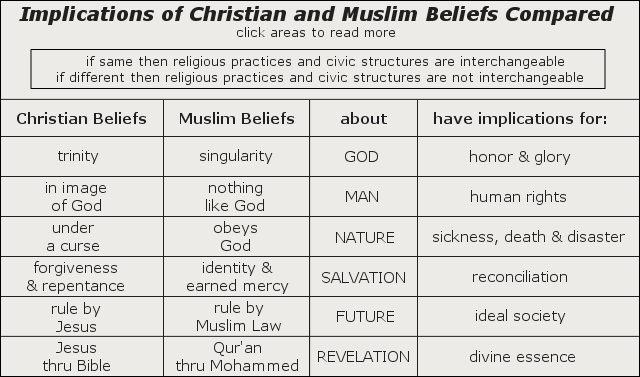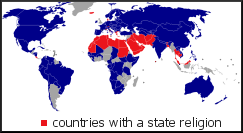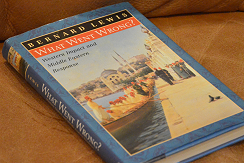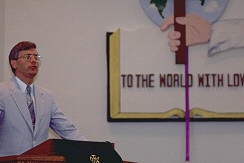This CLICKABLE CHART illustrates the implications of the differences between Christian and Muslim beliefs. Click different regions to go to articles about each part.

Links: Introduction | God | Man | Nature | Salvation | Eschatology | Revelation
This CLICKABLE CHART illustrates the implications of the differences between Christian and Muslim beliefs. Click different regions to go to articles about each part.

Links: Introduction | God | Man | Nature | Salvation | Eschatology | Revelation
(Seventh in a series comparing the social impact of theological differences between Christianity and Islam)
Both Christianity and Islam believe in angels and prophets and in a God who communicates through holy scriptures, but their prophets and scriptures are very different.
Based on the thesis that people become like what they worship, and relate to one another based upon the way that they relate to God, in this series, I have compared and contrasted social implications of Muslim and Christian beliefs about God, man, nature, salvation, and the future. This last post in this series addresses the social implications of Muslim and Christian beliefs about divine revelation.
 In Muslim theology, the Qur’an is a verbatim incarnation of God’s word. It is an extension of divine essence and a part of eternity. In Christian theology, Jesus fulfills that role. While to most Christians the Bible is divinely inspired and miraculously without error, it is not an extension of God’s essence. The Bible quotes God, but it is not word for word in every word a direct quote from the mouth of God.
In Muslim theology, the Qur’an is a verbatim incarnation of God’s word. It is an extension of divine essence and a part of eternity. In Christian theology, Jesus fulfills that role. While to most Christians the Bible is divinely inspired and miraculously without error, it is not an extension of God’s essence. The Bible quotes God, but it is not word for word in every word a direct quote from the mouth of God.
Christians believe that Jesus is divine (John 10:30-33), so that every word of Jesus is a word straight from the mouth of God. That is how Muslims view the Qur’an. Christians believe that the Bible is divinely provided and protected in order to show us Jesus (John 5:39). Muslims believe that about Muhammad. They believe Muhammad was divinely provided and protected in order to give us the Qur’an.
As a result, in Muslim theology, burning a Qur’an would be like crucifying Christ or desecrating the Eucharist. Burning a Qur’an is exponentially more explosive than burning a Bible. In Indonesia, I saw a man die in a hospital from a beating after he’d been arrested for allegedly burning some verses of the Qur’an that were supposedly mixed in with some magic charms that he was burning. In Christian theology, burning the Bible is like burning a valuable and special book, but it is nothing to Christians like burning a Qur’an is to Muslims. Functionally, for their respective groups, the Bible and the Qur’an are different, so the responses of the respective groups are different as well.
Functionally, the Muslim equivalent to the Christian Bible is Muhammad as he is known through their hadith and sunnah.
The hadith are written records of the sayings and actions of Muhammad. The sunnah is the “way” of Muhammad that the hadith reveals. Without knowing the “way” of Muhammad, there can be no authoritative application of the Qur’an. Similarly, without the Bible, there can be no authoritative knowledge of Christ.
Muslims do not study the Qur’an devotionally the way that Christians study the Bible. Rather, what Muslims study devotionally is the life of Muhammad. Muslims find life lessons in the way that Muhammad conversed, ate, drank, slept, washed, and even had sex. Muhammad is devotionally equivalent to the Bible, not the Qur’an.
Muslim clerics are legal scholars as well as theological ones. Muslim people leave interpreting the Qur’an to trained clerics the way that Americans leave interpreting the Constitution to trained lawyers. Muslims often memorize large portions of the Qur’an. But memorizing the Qur’an does not give one authority to interpret and apply it any more than memorizing the U.S. Constitution gives one credentials for practicing constitutional law.
 For Christians, their ruler is Jesus. Though he rules a heavenly rather than an earthly kingdom, he still rules. Christians call Jesus their Lord as well as their Savior. The Muslim equivalent to Jesus is the Qur’an. Muslims are devoted to the Qur’an the way that Christians are devoted to Jesus, and they treat it legally the way that Americans treat the U.S. Constitution. The Qur’an is a Muslim’s highest sovereign in the same way that Jesus is a Christian’s highest sovereign.
For Christians, their ruler is Jesus. Though he rules a heavenly rather than an earthly kingdom, he still rules. Christians call Jesus their Lord as well as their Savior. The Muslim equivalent to Jesus is the Qur’an. Muslims are devoted to the Qur’an the way that Christians are devoted to Jesus, and they treat it legally the way that Americans treat the U.S. Constitution. The Qur’an is a Muslim’s highest sovereign in the same way that Jesus is a Christian’s highest sovereign.
This post has been about the form that God uses to communicate with people. Both Christianity and Islam have prophets and scriptures; however, those prophets and scriptures don’t correlate with one another. Christians revere the man Jesus as the essence of God, whom they receive and understand through the Bible. Muslims revere the Qur’an as an essence of god, which they receive and understand through their prophet Muhammad. Functionally Muhammad correlates to the Bible and the Qur’an correlates to Jesus. Correlating Jesus with Muhammad and the Bible with the Qur’an is a mistake for Muslims trying to understand Christianity and for Christians trying to understand Islam.
That concludes this blog series comparing the implications of Muslim and Christian beliefs on God, man, nature, salvation, the future, and revelation. Many more comparisons could be made. The two religions are very different from each other.
It’s important for Christians not to fall into the popular trap of allowing people who have no religious affiliation to treat Christianity and Islam as if they were the same. If Christianity and Islam are essentially the same, then their fundamentalists are the same as well. One of the biggest challenges to religious freedom for Evangelicals in America comes not from Muslims, but from people with no religious affiliation, who will inevitably treat Evangelicals as if they were the same threat to civic order as extremist Muslims.
Link through the chart to other posts on the social impact of Muslim and Christian theology:
(Sixth in a series comparing the social impact of theological differences between Christianity and Islam)
Islam teaches that Muhammad established an ideal society under Muslim law when he ran the government in Medina and eventually in Mecca. Most Muslims desire to return to that ideal by implementing Muslim law as closely as possible to the way that Muhammad would apply it under conditions that exist today.
Christianity teaches, on the other hand that, since the rebellion of mankind against God by Adam and Eve in the long-gone Garden of Eden, ideal civilization is impossible unless God establishes it himself. Christians believe Jesus is God, and they believe that Jesus will return to earth from heaven some day. Therefore, Christianity teaches that God will establish the ideal society on earth through Jesus. Christian waiting for Jesus is patient but not idle. Christians believe, that while Jesus is gone they should do the best at what they think Jesus would do, but they do not believe it is possible to have an ideal society without Jesus.
 These different visions for the future lead to different ways that Christians and Muslims engage in politics. Christians try to influence government and politics, but they no longer try to establish a theocratic government as the Byzantine emperors attempted from the fourth to the eleventh centuries. Jesus taught that his dominion was spiritual and non-material. He told the Roman governor who ordered his crucifixion, that if his kingdom had been of this world his followers would have been fighting for him (John 18:36). He told the Jewish leaders who wanted to rebel against Rome to pay their Roman taxes. He said “give to Caesar what is Caesars’ and to God what is God’s” (Matthew 22:17-21). This teaching from Jesus establishes the concept in Christian theology for of a separation of powers between church and state.
These different visions for the future lead to different ways that Christians and Muslims engage in politics. Christians try to influence government and politics, but they no longer try to establish a theocratic government as the Byzantine emperors attempted from the fourth to the eleventh centuries. Jesus taught that his dominion was spiritual and non-material. He told the Roman governor who ordered his crucifixion, that if his kingdom had been of this world his followers would have been fighting for him (John 18:36). He told the Jewish leaders who wanted to rebel against Rome to pay their Roman taxes. He said “give to Caesar what is Caesars’ and to God what is God’s” (Matthew 22:17-21). This teaching from Jesus establishes the concept in Christian theology for of a separation of powers between church and state.
Muslim theology has no such church-state separation paradigm. The Muslim ideal strives for uniting political and religious power rather than separating those powers.
Nation states and empires are inevitably violent. Governments arm policemen, field armies, and produce weapons, not priests and imams or mosques and churches. And governments use those armies and weapons to violently defend or advance their ideologies. The United States of America defends and advances democracy with great violence.
When Christians have been violent (as in the Crusades, the Inquisition, and today’s “war on terror”), it is for political rather than religious reasons. But today’s violent Muslim non-state actors are violent precisely because they are attempting to establish a Muslim state. It’s not Islam as a religion that is violent, but Islam as a political system. And because the Muslim ideal is a Muslim state, Islam will always be violent, because states will always be violent.
Christianity grew and thrived for over three centuries as a persecuted religion in both Roman and Persian empires. But, as Bernard Lewis writes in his book What Went Wrong (published by Oxford University Press in 2002),
 “Muhammad achieved victory and triumph in his own lifetime. He conquered his promised land, and created his own state, of which he himself was supreme sovereign. As such, he promulgated laws, dispensed justice, levied taxes, raised armies, made war, and made peace. In a word, he ruled, and the story of his decisions and actions as ruler is sanctified in Muslim scripture and amplified in Muslim tradition” (p. 101).
“Muhammad achieved victory and triumph in his own lifetime. He conquered his promised land, and created his own state, of which he himself was supreme sovereign. As such, he promulgated laws, dispensed justice, levied taxes, raised armies, made war, and made peace. In a word, he ruled, and the story of his decisions and actions as ruler is sanctified in Muslim scripture and amplified in Muslim tradition” (p. 101).
Lewis also notes,
“The idea that any group or persons, any kind of activities, any part of human life is in any sense outside the scope of religious law and jurisdiction is alien to Muslim thought. There is, for example, no distinction between cannon law and civil law, between the law of the church and the law of the state, crucial in Christian history. There is only a single law, shari’a, accepted by Muslims as of divine origin and regulating all aspects of human life: civil, commercial, criminal, constitutional, as well as matters more specifically concerned with religion in the limited, Christian sense of that word” (p. 100).
This post has covered differences between Muslim and Christian beliefs about future world civilization. Both Christianity and Islam are idealistic and triumphal, however, Christians believe that only Jesus can establish an ideal society while Muslims strive for an ideal civilization on the earth through Muslim government and law. The results of these theological differences play out everywhere on the world stage. Politicians and diplomats ignore or minimize these differences to their peril. The next post in this series will explore Muslim and Christian differences in beliefs about divine revelation.
Link through the chart to other posts on the social impact of Muslim and Christian theology:
(Fifth in a series comparing the social impact of theological differences between Christianity and Islam)
My last post covered implications of the differences between Islam and Christianity over how mankind relates to nature. This post will cover implications of the differences over how mankind relates to God.
 In both Christianity and Islam salvation depends upon an exclusive faith-based identity. Muslims believe that forgiveness comes exclusively through Islam, and Christians believe that forgiveness comes exclusively through Jesus (John 14:6). The similarity stops there. Muslims believe in two angels (the two kiraman katibin) who record good and bad deeds, words, feelings, and thoughts. Going to heaven instead of hell depends upon being a Muslim and upon God’s mercy in evaluating the record of one’s good and bad deeds and intentions.
In both Christianity and Islam salvation depends upon an exclusive faith-based identity. Muslims believe that forgiveness comes exclusively through Islam, and Christians believe that forgiveness comes exclusively through Jesus (John 14:6). The similarity stops there. Muslims believe in two angels (the two kiraman katibin) who record good and bad deeds, words, feelings, and thoughts. Going to heaven instead of hell depends upon being a Muslim and upon God’s mercy in evaluating the record of one’s good and bad deeds and intentions.
In Christianity, people cannot mitigate their own sin with good words and deeds. Only God can mitigate sin. Theologians call the process “atonement.” It happens through the historical sacrificial death of Jesus Christ. God forgives sins, people repent, and a broken relationship with God gets restored. Repentance for Christians involves confessing and taking responsibility for sins, and then turning away from sin through the regenerating power of the Holy Spirit. Christians call this “salvation by grace through faith not of works” (Ephesians 2:8-9). It means salvation is not affected by good deeds but is a free gift to all who reconcile with God through a faith allegiance to the identity and work of Jesus Christ. Because forgiveness starts with God and is guaranteed by God, Christians have assurance that God won’t punish them when they confess their sins (1 John 1:9). From a relational point of view, forgiveness is not yet a relationship. Forgiveness merely forgoes the right to demand justice, punishment, or restitution. It’s half of reconciliation. The other half is repentance.
 The concept that people relate to one another based upon the way that they relate to God is part of Christian tradition. Jesus taught his followers that they were to forgive one another just as graciously as their heavenly Father had forgiven them (Matthew 6:12-15). People in societies following the pattern for reconciliation set by God in Jesus Christ, expect to be forgiven when they repent – when they take responsibility and promise to change. They expect mitigated consequences when they sincerely apologize.
The concept that people relate to one another based upon the way that they relate to God is part of Christian tradition. Jesus taught his followers that they were to forgive one another just as graciously as their heavenly Father had forgiven them (Matthew 6:12-15). People in societies following the pattern for reconciliation set by God in Jesus Christ, expect to be forgiven when they repent – when they take responsibility and promise to change. They expect mitigated consequences when they sincerely apologize.
People in Muslim societies rarely apologize as an initial step towards reconciliation. Rather, the offender will usually work on restitution and try to reestablish relationship first. Think about it. If forgiveness from god is affected by merit, then forgiveness from one’s neighbor will be too. The more responsibility one accepts for an offense, then the higher the price of restitution. Muslims will often ask for forgiveness without admitting responsibility. Muslims who want to be in relationship will often mutually blame uncontrollable circumstances, someone else, or even god as a way to reduce the price for restoring the balance of good and bad deeds between them.
Based upon these patterns, apologizing for accidentally burning Qur’ans or for the existence of videos and cartoons that insult Muhammad is a mistake. So is apologizing for past offenses like the Crusades or Colonialism. It’s like a doctor apologizing for accidentally sewing his scissors into a patient after removing an appendix. It just increases liability and the cost of settlement. Islam is a legal system as well as a religion. Forgiveness is earned. It may or may not follow restitution. Apologizing admits responsibility, so the more abject the apology, the greater the admission of responsibility, and the greater the responsibility, then the costlier the settlement.
Also, among Muslims, potential for reconciliation is higher for insiders than for outsiders. In Christian theology of salvation, people reconcile with God first, and then they become “true” Christians. In Muslim salvation, people become “true” Muslims first, and then they can be reconciled with god. The Christian God treats everyone the same. He offers forgiveness to everyone, whether Christian or non-Christian. The Muslim god treats Muslims and non-Muslims differently. Like their god, Muslims treat insiders and outsiders differently.
 Actually, Muslims often ask each other for forgiveness. In fact, requesting forgiveness from friends and relatives is an important component of Muslim holiday celebrations. In Muslim cultures, however, maturity and good character don’t require admitting faults or taking personal responsibility for mistakes. Offenses are often forgiven without anyone ever admitting guilt. It’s like a legal settlement in court or no-fault insurance where money changes hands but no one admits that they were wrong.
Actually, Muslims often ask each other for forgiveness. In fact, requesting forgiveness from friends and relatives is an important component of Muslim holiday celebrations. In Muslim cultures, however, maturity and good character don’t require admitting faults or taking personal responsibility for mistakes. Offenses are often forgiven without anyone ever admitting guilt. It’s like a legal settlement in court or no-fault insurance where money changes hands but no one admits that they were wrong.
From a Muslim perspective, it is the Christian pattern for reconciliation that miscarries justice. It requires that the offended party be ready and willing to forgive once a sincere apology is offered. It means you don’t actually need to do anything in order to be forgiven. It means that even the wickedest person can reconcile with God and have absolute certainty of eternal salvation. And it puts the offender rather than the offended in control. Ultimately, it appears to turn justice and divine sovereignty upside down.
This post has covered differences between Muslim and Christian beliefs about salvation. Christians believe that salvation to eternal life flows from a restored relationship with God through forgiveness and repentance that makes one a Christian. Muslims believe salvation into paradise happens only for Muslims as God mercifully considers their good and bad deeds. These differences profoundly influence human relationships resulting in different behaviors and social structures. In interpersonal relationships, Christians are expected to grant forgiveness for sincere apologies while Muslims grant forgiveness when it is earned.
The next post in this series will explore Muslim and Christian differences in beliefs about the future.
Link through the chart to other posts on the social impact of Muslim and Christian theology:
(Fourth in a series comparing the social impact of theological differences between Christianity and Islam)
My last post compared and contrasted Muslim and Christian beliefs about man. This post will show how different beliefs about man result in different beliefs about man’s relationship to nature.
In the Christian Scriptures it is written that on the sixth day of creation God said, “Let us make man in our image, in our likeness, and let them rule over the fish of the sea and the birds of the air, over the livestock, over all the earth, and over all the creatures that move along the ground” (Genesis 1:26). In Christian thought, this Scripture teaches that God wants man be his steward of creation.
Furthermore, in the Christian gospels it is written that Jesus healed the sick, raised the dead, and calmed the storm (Acts 2:22). Now, for Christians, Jesus is the behavior (way), character (truth), and will (life) of God incarnated into human flesh (John 14:6). Jesus demonstrates the will of God for mankind (John 20:21). Therefore, Christians believe that fighting against sickness, death, and natural disasters is fighting against evil and is according to the will of God. As a result, Western civilization has a rich heritage of struggling to improve and prolong human life with medical care, emergency services, community development, and disaster relief.
Most of the world, and particularly most of the Muslim world, does not share this passion for excellence and constant improvement in medical care, emergency services, community development, and disaster relief. A natural disaster anywhere in the Muslim world almost always kills far more people than an equivalent disaster somewhere in the Western world.
 When I was living among Muslims in Indonesia, I saved a man from drowning by performing mouth-to-mouth artificial respiration on him. The lifeguards at the pool had been performing the long discredited back-pressure-arm-lift method of resuscitation. I got him breathing again but not back to full consciousness, so he had to be taken to the hospital where the doctors and nurses thought that I had sucked the water out of his lungs in order to revive him. An article in the paper the next day said that fortunately for the young man a foreigner happened to be there to give him assisted breathing while removing the water that he had swallowed.
When I was living among Muslims in Indonesia, I saved a man from drowning by performing mouth-to-mouth artificial respiration on him. The lifeguards at the pool had been performing the long discredited back-pressure-arm-lift method of resuscitation. I got him breathing again but not back to full consciousness, so he had to be taken to the hospital where the doctors and nurses thought that I had sucked the water out of his lungs in order to revive him. An article in the paper the next day said that fortunately for the young man a foreigner happened to be there to give him assisted breathing while removing the water that he had swallowed.
While serving among embedded military advisors in Iraq, I observed that it was very difficult for American advisors to persuade Iraqi soldiers and military leaders to wear protective equipment, like eye protection, body armor, and helmets during combat operations. The Iraqi response was always, “Insyallah,” which means “if God wills.” They seemed to be saying that whether they lived or died was God’s will so that they did not need to bother with wearing protective equipment.
 The word “Islam” comes from the Arabic root word “Salema” which means peace, purity, submission and obedience. At its essence, Islam is submission to the will of God and obedience to His law.
The word “Islam” comes from the Arabic root word “Salema” which means peace, purity, submission and obedience. At its essence, Islam is submission to the will of God and obedience to His law.
From the Muslim perspective, every phenomenon in the world, other than man, is administered totally by God-made laws. All of nature obeys God and submits to his will. It is said to be in the “State of Islam.”
That is different than the Christian view. The apostle Paul writes in his letter to the Romans that all of creation is in bondage to decay and waits patiently for restoration through the ones who are becoming children of God (Romans 8:20-22).
If nature is in a state of submission to the will of God, then that means that sickness, death, and natural disasters are according to his will. According to Muslim thinking, only human beings have the capacity to rebel against the will of God. Mankind is invited to submit to the will of god and to obey god’s law through the religion of Islam. Muslims believe that submission to the good will of god, together with obedience to his beneficial law is the best safeguard for man’s peace and harmony.
The logical extrapolation of this thinking is that resisting forces of nature that manifest themselves in sickness, death, and natural disaster is equivalent to resisting the will of God. Wearing protective equipment or being skilled in the latest techniques for resuscitating drowning victims reveals a lack of spirituality and a lack of submission to God’s will.
In the Christian view, nature itself has been disturbed by evil, and one of God’s purposes for humanity is not only to struggle against evil in oneself, but also to struggle against evil in nature. In the Muslim view, however, God completely controls all of nature.
Islam does call upon humanity to struggle. The word for struggle is “jihad.” Muslims are called to jihad against everything that sets itself up against the will and law of god. Jihad can be an internal personal struggle against sin, and it can be an external communal defense of Islam. But Muslims are not called to jihad against death, sickness, and natural disasters the way that Christians are. Nature, for the Muslim, is still under the control and will of God.
This blog has covered differences between Muslim and Christian beliefs about the nature of creation and man’s relationship to it. The next in this series will explore differences in beliefs about man’s relationship to God.
Link through the chart to other posts on the social impact of Muslim and Christian theology: